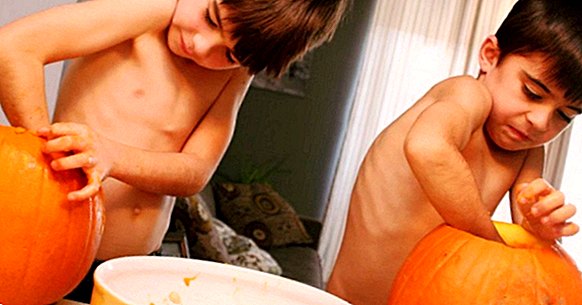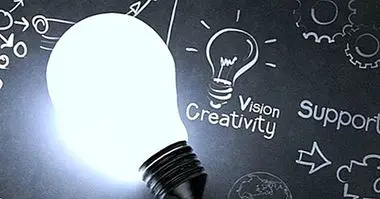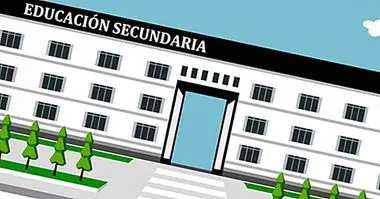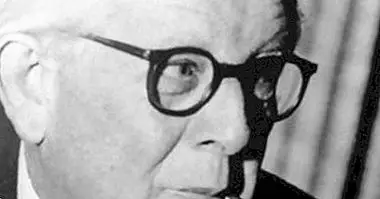The 6 stages of childhood (physical and psychic development)
Childhood is the stage of life that goes from birth to youth. However, within this phase there are also different moments that mark the rhythms of the child's development, both physically and psychologically.
That's why it's possible distinguish between different stages of childhood . This is a classification that both psychologists and health professionals in general have much in mind to understand how human beings think, feel and act when they go through their first years of life.
The stages of childhood
Next we will give a brief review of these stages of childhood and the physical and mental changes that occur in the passage from one to another.
However, we must bear in mind that the limits between these phases are diffuse and do not always occur in the same way; every boy and girl is a world.
1. Intrauterine period
Although childhood is considered to start at the moment of birth, sometimes it is assumed that it can start earlier, especially in cases of premature birth . This phase includes the early and late fetal period, and involves processes of rapid formation and improvement of the senses.
It must be borne in mind that, although at this stage you are totally dependent on others, the main learnings are already taking place, especially through the ear. But nevertheless, these are subject to a very simple and basic type of memorization . For example, at this stage the areas of the brain that are concerned with giving basis to autobiographical memory have not yet been developed.
This stage of life is characterized by the fact that neither the biological structures of the organism have matured, nor the child has had the opportunity to learn from the immersion in a social and sensorially stimulating environment.
2. Neonatal period
This phase of childhood begins at birth and ends approximately at the end of the first month. In the neonatal period babies learn the main regularities of the world around them and establish more direct communication with other human beings, although still not in a position to understand the concept of "I" and "you" since language is not yet mastered .
In addition, since the first days babies show an amazing ability to distinguish phonemes and, in fact, are able to discriminate different languages by how they sound.
With regard to physical changes, at this stage of childhood begins to produce the growth of the entire body less than the head. Further, in this phase he is very vulnerable , and sudden death is much more frequent in this space of time.
3. Post-neonatal or infant period
This is still one of the earliest stages of childhood, but in this case, unlike the previous stage, the physical and psychological changes are easier to notice.
In the infant stage you begin to develop a sufficient musculature to maintain an upright posture and, moreover, towards the 6 months begins to emit babbling and false words. In addition, you learn to coordinate parts of the body so that it is easy to move them at once with precision (fine motor development).
Of course, breastfeeding is a very important element in this phase of growth, since it provides both food and a channel of communication with the mother that allows emotional ties to be strengthened.
4. Early childhood period
Early childhood goes from the first to the third year of age, and roughly coincides with the stage at which boys and girls attend daycare . Here you start to control the use of the language itself, although at the beginning it is a telegraphic language with single words and later you gain the ability to formulate simple sentences with inaccuracies such as generalization (call a dog "cat", for example). ).
On the other hand, in this phase we start to gain control of the sphincters and we show a strong will to explore and discover things; according to Jean Piaget, this curiosity was precisely the motor of learning.
In addition, at this stage thinking is fundamentally egocentric in the sense that it's hard to imagine what others think or believe .
As for the physical changes, the size of the winch and the limbs continues to grow, and the difference in size between the head and the rest of the body is reduced, although this development is slower than in the previous stages.
5. Preschool period
The preschool period goes from 3 to 6 years. This is the stage of childhood in which the ability of the Theory of Mind is gained, that is, the ability to attribute unique intentions, beliefs and motivations (that are different from their own) to others.This new capacity greatly enriches social relationships, but also allows the lie to be more useful and effective as a resource.
Also, here his ability to think in abstract terms develops more , partly because of the myelination of their brain and partly because they usually start dealing with large communities that are not only the father and the mother.
On the one hand, myelination makes more parts of the brain are connected to each other, which allows more abstract concepts to be created from the combination of ideas of many types, and on the other the enrichment of the type of interactions to which The boy or girl submits so that their cognitive abilities learn to perform more complex tasks.
In this phase we begin to reach agreements, to negotiate and to seek to give a concrete image. At the end of this, many times you start trying to adjust one's behavior to gender roles , and cases of gender dysphoria appear frequently throughout this stage.
- Maybe you're interested: "The 5 differences between sex and gender"
6. School period
The school period is the last stage of childhood and the one that gives way to adolescence. It goes from 6 to 12 years and in this phase the ability to think in abstract and mathematical terms develops a lot, although it does not reach its maximum. This is due to Myelination of the brain continues its course (And it will not slow down until the third decade of life). The frontal lobes begin to be better connected with other parts of the brain, and this facilitates a better command of executive functions such as attention management and decision making following consistent strategies.
In addition, in the school stage the image that is given begins to have even more importance , and it is about winning the friendship of those who are considered important.
The social circle outside the family begins to be one of the factors that shape the identity of children, and this makes family norms begin to be broken frequently and being aware of it. It is partly this that makes this stage of childhood begin to be vulnerable to addictions, which can leave significant alterations in the brain, as in the case of alcohol consumption that in many cases begins with puberty at the beginning of adolescence.
Impulsivity is also a characteristic of this stage, as is the propensity to prefer short-term goals than those that are very far away in the future. At the end of the school period the body begins to manifest the signs of puberty , marked by the voice changes in males and the growth of breasts in girls, among other things.



















